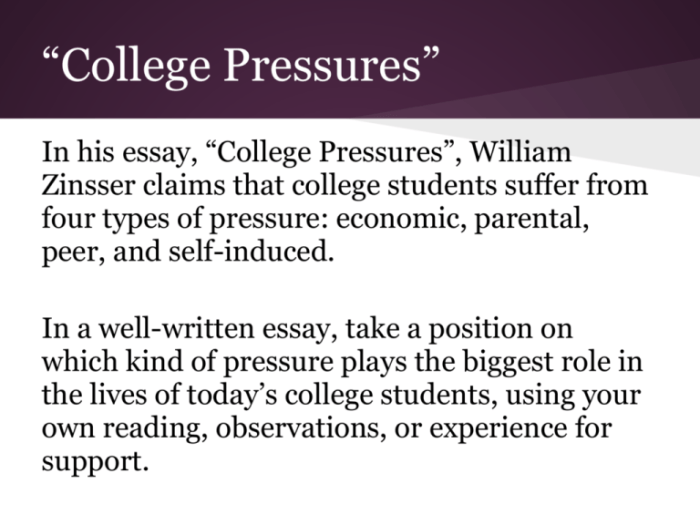College pressures by william zinsser – William Zinsser’s seminal essay, “College Pressures,” provides a comprehensive examination of the multifaceted pressures faced by college students today. This insightful work explores the academic, social, and financial challenges that can impact students’ well-being and offers practical strategies for coping with these stressors.
Zinsser’s analysis delves into the causes of college pressures, identifying the academic rigor, social expectations, and financial burdens that can weigh heavily on students. He also highlights the role that universities can play in mitigating these pressures by fostering a supportive environment and implementing programs to address students’ needs.
College Pressures by William Zinsser

In his essay “College Pressures,” William Zinsser explores the multitude of pressures faced by college students in today’s competitive academic environment. Zinsser argues that these pressures can have a significant impact on students’ mental and physical health, and he calls for colleges and universities to do more to support students’ well-being.
Types of Pressures Faced by College Students, College pressures by william zinsser
The pressures faced by college students today can be divided into several categories:
- Academic pressures:These include the pressure to achieve high grades, complete assignments on time, and succeed in a competitive environment.
- Financial pressures:The cost of college is rising, and many students are struggling to pay for tuition, fees, and living expenses.
- Social pressures:College students are often under pressure to fit in and make friends.
They may also feel pressure to participate in extracurricular activities and maintain a social life.
- Emotional pressures:College students are often facing a variety of emotional challenges, such as homesickness, anxiety, and depression.
- Physical pressures:College students may also experience physical pressures, such as sleep deprivation, poor nutrition, and lack of exercise.
Impact of Pressures on Students’ Mental and Physical Health
The pressures faced by college students can have a significant impact on their mental and physical health. Academic pressures, for example, can lead to anxiety, depression, and even suicidal thoughts. Financial pressures can lead to stress, worry, and even homelessness.
Social pressures can lead to loneliness, isolation, and low self-esteem. Emotional pressures can lead to anxiety, depression, and eating disorders. Physical pressures can lead to fatigue, illness, and injury.
Causes of College Pressures

College students face a myriad of pressures that can impact their academic, social, and financial well-being. These pressures can stem from various sources, including academic expectations, social interactions, and financial responsibilities.
Academic Pressures
- High expectations: Students often feel immense pressure to excel academically, particularly in competitive programs or institutions. They may strive to maintain high grades, participate in extracurricular activities, and secure internships or research opportunities to enhance their future prospects.
- Workload and deadlines: College courses typically involve a heavy workload, with multiple assignments, projects, and exams scheduled within tight deadlines. Students may struggle to balance their academic responsibilities with other commitments, leading to feelings of stress and anxiety.
- Competition: In many college environments, students face intense competition from peers. They may compare themselves to others, leading to feelings of inadequacy or self-doubt. This competitive atmosphere can create a pressure to perform well and outshine others.
Social Pressures
- Fitting in: Students may experience pressure to conform to social norms and expectations within their college community. They may feel the need to dress a certain way, participate in specific activities, or adopt certain values to gain acceptance and avoid social isolation.
- Relationship expectations: College students often navigate romantic and platonic relationships, which can bring their own set of pressures. They may feel pressure to maintain relationships, find a partner, or engage in social activities to meet societal expectations or avoid loneliness.
- Diversity and inclusion: Students from diverse backgrounds may encounter social pressures related to race, ethnicity, gender, or sexual orientation. They may face discrimination, microaggressions, or a lack of representation, which can create feelings of isolation and undermine their sense of belonging.
Financial Pressures
- Tuition and fees: College education can be expensive, and students may face significant financial burdens related to tuition, fees, and living expenses. They may need to take on loans, work part-time jobs, or rely on financial aid to cover these costs.
- Living expenses: In addition to tuition, students must also cover living expenses such as housing, food, transportation, and healthcare. These costs can vary depending on the location and lifestyle of the student, and can add to the financial pressure they experience.
- Debt and repayment: Many students graduate with significant student loan debt, which can weigh heavily on their financial future. They may face pressure to secure high-paying jobs or pursue graduate education to earn enough to repay their loans.
Coping Mechanisms for College Pressures
College students face a variety of pressures, from academic stress to social pressures to financial concerns. These pressures can take a toll on students’ mental and physical health, as well as their academic performance. However, there are a number of effective coping mechanisms that students can use to manage these pressures.
Managing Academic Stress
Academic stress is one of the most common challenges that college students face. Students can manage academic stress by:
- Setting realistic goals and expectations for themselves.
- Breaking down large assignments into smaller, more manageable tasks.
- Starting assignments early and avoiding procrastination.
- Taking breaks throughout the day and engaging in relaxation techniques, such as meditation or yoga.
- Seeking help from professors, teaching assistants, or tutors when needed.
Dealing with Social Pressures
Social pressures can also be a major source of stress for college students. Students can deal with social pressures by:
- Getting involved in activities and clubs that they enjoy.
- Making an effort to meet new people and build relationships.
- Learning to say no to activities or events that they don’t have time for or that make them uncomfortable.
- Setting boundaries with friends and family members who may be putting pressure on them.
Addressing Financial Concerns
Financial concerns can be a major source of stress for college students. Students can address financial concerns by:
- Creating a budget and sticking to it.
- Looking for ways to reduce expenses, such as by living in a dorm or sharing an apartment with roommates.
- Getting a part-time job or applying for scholarships and financial aid.
- Talking to a financial advisor about managing debt.
The Role of Universities in Addressing College Pressures

Universities have a crucial role in mitigating the academic, social, and financial pressures faced by their students. They can implement various measures to foster a supportive environment and alleviate these burdens.
Academic Pressures
Universities can reduce academic pressures by offering flexible learning options, providing academic support services, and promoting mental health awareness.
- Flexible learning options, such as online courses and part-time programs, allow students to balance their academic responsibilities with other commitments.
- Academic support services, such as tutoring, writing centers, and counseling, provide students with the necessary resources to succeed academically.
- Promoting mental health awareness and providing access to mental health services can help students cope with the stress and anxiety associated with academic pressures.
Social Pressures
Universities can create a more supportive social environment for students by fostering a sense of community, promoting diversity and inclusion, and providing opportunities for social engagement.
- Fostering a sense of community through student organizations, clubs, and events can help students feel connected and supported.
- Promoting diversity and inclusion by creating a welcoming environment for students from all backgrounds can reduce feelings of isolation and alienation.
- Providing opportunities for social engagement, such as social mixers, volunteer opportunities, and cultural events, can help students build social connections and reduce feelings of loneliness.
Financial Pressures
Universities can address financial pressures by providing financial aid, offering financial literacy programs, and advocating for policies that reduce the cost of higher education.
- Providing financial aid in the form of scholarships, grants, and loans can help students cover the cost of tuition, fees, and living expenses.
- Offering financial literacy programs can help students manage their finances and make informed decisions about their financial future.
- Advocating for policies that reduce the cost of higher education, such as increased funding for public universities and student loan forgiveness programs, can make college more affordable for all students.
Answers to Common Questions
What are the most common types of college pressures?
College students often face academic pressures, such as maintaining high grades and meeting deadlines. They may also experience social pressures to fit in and conform to peer expectations. Financial pressures, such as paying for tuition and living expenses, can also be a significant source of stress.
How can college students cope with academic stress?
Effective strategies for managing academic stress include setting realistic goals, breaking down large tasks into smaller ones, and seeking support from professors and classmates. Students should also prioritize their mental and physical health by getting enough sleep, exercising regularly, and eating a healthy diet.